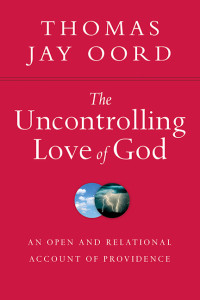A TimeFull God Creates & Acts with an End in Mind
Many people think a timeless God created the universe and is its eschatological hope. By contrast, I think we make better sense of creation and eschatology if we think God is timefull rather than timeless.
In a previous essay, I identified four dimensions of an open and relational — “God-in-process” — view of providence. Here’s a link. In this essay, I continue my previous train of thought and address the beginning and end from a timefull God theological perspective.
God Continually Creates
Open and relational theologies affirm God is Creator. God created in the past and creates in the present. God continually creates (creatio continua). Creation depends moment-by-moment upon divine creativity.

The idea God continually creates fits nicely with the general theory of evolution. The vast majority of contemporary biologists say new species emerged slowly over a long period, thanks to various forces and factors.
Most open and relational theologies agree with the general theory of evolution. But they claim God acts in the evolutionary process. A timefull God creates through evolution (and other forces).
God also empowers creatures to co-create alongside their Creator. This view fits nicely with biblical claims about God calling creation to create (Genesis 1) and contemporary scientific views that speak of the emergence of new species. God’s creating is noncoercive. Random genetic mutations, natural selection, creaturely self-organization, evolutionary dead ends, and natural evils are compatible with God’s uncontrolling, creative love.
Creation out of Nothing?
Open and relational theologies differ on whether God ever creates from a ‘blank slate,’ i.e., out of nothing (creatio ex nihilo). Although the view isn’t explicitly stated in Scripture, some affirm creation from nothing for metaphysical reasons. Creatio ex nihilo implies that creation depends upon God. It also implies that God differs from creation in a crucial way.
Other God-in-process theologies say God never faced a completely blank slate. They reject creatio ex nihilo, and they think God everlastingly creates. God differs from creation in some ways but not others.
Most who accept creatio ex nihilo and reject it affirm with contemporary science that this universe began with a big bang roughly 13.8 billion years ago. And they affirm with Scripture that God is Creator. (For more on the diverse views, see a book of scholarly essay I edited: Theologies of Creation: Creatio ex Nihilo and Its New Rivals.)
God-in-process views offer a methodological advantage for thinking about theology and science. These views says efforts to understand existence require both scientific and theological contributions. Any scientific theory claiming to explain reality fully without reference to God is false. Any theology claiming to explain reality fully without reference to nature is false.
We need both science and theology to make sense of life.
God Has Plans but No Blueprint
Most theologies assume God’s providence follows a foreordained and foreknown plan. The God who is outside time predetermined creation’s current events and future outcomes. Or this God foreknows – in some mysterious way – precisely how history plays out.
From a timeless God perspective, divine providence is like a detailed blueprint portraying all events in advance.
Open and relational theologies deny that God foreordains or foreknows exhaustively. The future is open, and the present becomes what a timefull God and creation decide. An uncontrolling God cannot guarantee or foreknow all outcomes.

The God of open and relational theology has plans and desires, however. God leads creation toward fulfilling them. This is not the God of deism watching from a distance. Nor is this an aloof and detached deity.
God makes plans for love to win. And God empowers creatures to cooperate in fulfilling those plans. God works in each situation to call, persuade, or command creatures to choose well-being.
God-in-process models might think of providence like an improvisational play. The play has a Director and general direction. But creaturely actors play essential roles in deciding how the plot unfolds.
God-in-process models might also think of providence like a jazz session. Each musician contributes, and there’s a general movement toward the possibility of beautiful art. But the artists determine together how the music develops.
These models might also think of providence like a family. A perfectly loving Parent nurtures and instructs children. This Parent directs the whole family toward well-being. But the family’s health depends on the decisions of all members, not just the Parent.
(For more, see the blog essay, “Ways to Think about Providence.“)
God Acts with the End in Mind
Open and relational theologies embrace diverse eschatologies. Their views on the end contrast those theologies that assume God is timeless. Divine providence does not proceed according to a preset eschatological scheme.
Open and relational theologies describe a God motivated by persuasive love. God imagines a better future and calls creation to embrace the best in each moment, depending on what’s possible. (For what this means in terms of heaven, hell, or annihilation, see my “Relentless Love” view of the afterlife.)
Those who embrace love cooperate with God’s work to redeem all creation. Their cooperation promotes overall well-being. Those that fail to cooperate reap the natural negative consequences that come from saying no to the well-being God offers. Their lack of cooperation negatively affects others too.
If God foreordained and foreknew all that will occur, the future must already be settled, complete, and fixed. If the future is complete, creaturely decisions cannot be made freely in relation to possible futures. There is only one way things can play out.

Without genuine creaturely freedom, it’s hard to imagine how creatures are morally or socially responsible. Without social and moral responsibility, it’s hard to see how creatures ultimately matter. God-outside-of-time views are difficult to reconcile with our the deep intuition that what happens in our own livesmakes an ultimate difference.
Open and relational theologies say creatures make a real difference to how history unfolds. Our lives count.
Conclusion
How one believes God relates with time matters. Timefull theologies offer plausible views of how God created and creates. They also offer hopeful views of what the future can be.
Theologies that say God is timefull rather than timeless offer better views of God's ongoing creating and loving eschatology. Share on X
Comments
as a scientist… this is comforting….and terrifying.